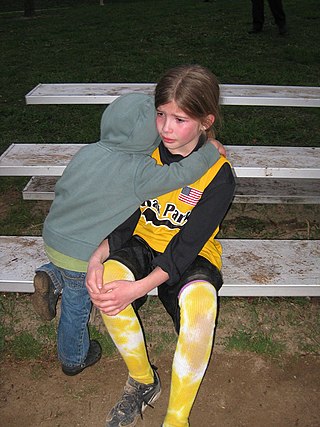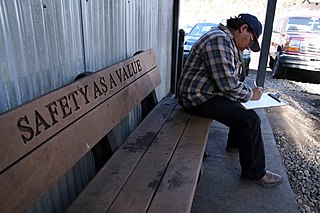Related Research Articles
Industrial and organizational psychology "focuses the lens of psychological science on a key aspect of human life, namely, their work lives. In general, the goals of I-O psychology are to better understand and optimize the effectiveness, health, and well-being of both individuals and organizations." It is an applied discipline within psychology and is an international profession. I-O psychology is also known as occupational psychology in the United Kingdom, organisational psychology in Australia and New Zealand, and work and organizational (WO) psychology throughout Europe and Brazil. Industrial, work, and organizational (IWO) psychology is the broader, more global term for the science and profession.
Psychology is the study of mind and behavior. Its subject matter includes the behavior of humans and nonhumans, both conscious and unconscious phenomena, and mental processes such as thoughts, feelings, and motives. Psychology is an academic discipline of immense scope, crossing the boundaries between the natural and social sciences. Biological psychologists seek an understanding of the emergent properties of brains, linking the discipline to neuroscience. As social scientists, psychologists aim to understand the behavior of individuals and groups.
Occupational therapists (OTs) are health care professionals specializing in occupational therapy and occupational science. OTs and occupational therapy assistants (OTAs) use scientific bases and a holistic perspective to promote a person's ability to fulfill their daily routines and roles. OTs have training in the physical, psychological, and social aspects of human functioning deriving from an education grounded in anatomical and physiological concepts, and psychological perspectives. They enable individuals across the lifespan by optimizing their abilities to perform activities that are meaningful to them ("occupations"). Human occupations include activities of daily living, work/vocation, play, education, leisure, rest and sleep, and social participation.
Applied psychology is the use of psychological methods and findings of scientific psychology to solve practical problems of human and animal behavior and experience. Educational and organizational psychology, business management, law, health, product design, ergonomics, behavioural psychology, psychology of motivation, psychoanalysis, neuropsychology, psychiatry and mental health are just a few of the areas that have been influenced by the application of psychological principles and scientific findings. Some of the areas of applied psychology include counseling psychology, industrial and organizational psychology, engineering psychology, occupational health psychology, legal psychology, school psychology, sports psychology, community psychology, neuropsychology, medical psychology and clinical psychology, evolutionary psychology, human factors, forensic psychology and traffic psychology. In addition, a number of specialized areas in the general area of psychology have applied branches. However, the lines between sub-branch specializations and major applied psychology categories are often mixed or in some cases blurred. For example, a human factors psychologist might use a cognitive psychology theory. This could be described as human factor psychology or as applied cognitive psychology. When applied psychology is used in the treatment of behavioral disorders there are many experimental approaches to try and treat an individual. This type of psychology can be found in many of the subbranches in other fields of psychology.

Compassion is a social feeling that motivates people to go out of their way to relieve the physical, mental, or emotional pains of others and themselves. Compassion is sensitivity to the emotional aspects of the suffering of others. When based on notions such as fairness, justice, and interdependence, it may be considered partially rational in nature.

Occupational therapy (OT) is a healthcare profession that involves the use of assessment and intervention to develop, recover, or maintain the meaningful activities, or occupations, of individuals, groups, or communities. The field of OT consists of health care practitioners trained and educated to improve mental and physical performance. Occupational therapists specialize in teaching, educating, and supporting participation in any activity that occupies an individual's time. It is an independent health profession sometimes categorized as an allied health profession and consists of occupational therapists (OTs) and occupational therapy assistants (OTAs). While OTs and OTAs have different roles, they both work with people who want to improve their mental and or physical health, disabilities, injuries, or impairments.
Mobbing, as a sociological term, refers either to bullying in any context, or specifically to that within the workplace, especially when perpetrated by a group rather than an individual.
Health psychology is the study of psychological and behavioral processes in health, illness, and healthcare. The discipline is concerned with understanding how psychological, behavioral, and cultural factors contribute to physical health and illness. Psychological factors can affect health directly. For example, chronically occurring environmental stressors affecting the hypothalamic–pituitary–adrenal axis, cumulatively, can harm health. Behavioral factors can also affect a person's health. For example, certain behaviors can, over time, harm or enhance health. Health psychologists take a biopsychosocial approach. In other words, health psychologists understand health to be the product not only of biological processes but also of psychological, behavioral, and social processes.

Safety culture is the collection of the beliefs, perceptions and values that employees share in relation to risks within an organization, such as a workplace or community. Safety culture is a part of organizational culture, and has been described in a variety of ways, notably the National Academies of Science and the Association of Land Grant and Public Universities have published summaries on this topic in 2014 and 2016.
Compassion fatigue is an evolving concept in the field of traumatology. The term has been used interchangeably with secondary traumatic stress (STS), which is sometimes simply described as the negative cost of caring. Secondary traumatic stress is the term commonly employed in academic literature, although recent assessments have identified certain distinctions between compassion fatigue and secondary traumatic stress (STS).
Organizational behavior management (OBM) is a subdiscipline of applied behavior analysis (ABA), which is the application of behavior analytic principles and contingency management techniques to change behavior in organizational settings. Through these principles and assessment of behavior, OBM seeks to analyze and employ antecedent, influencing actions of an individual before the action occurs, and consequence, what happens as a result of someone's actions, interventions which influence behaviors linked to the mission and key objectives of the organization and its workers. Such interventions have proven effective through research in improving common organizational areas including employee productivity, delivery of feedback, safety, and overall morale of said organization.
Occupational health psychology (OHP) is an interdisciplinary area of psychology that is concerned with the health and safety of workers. OHP addresses a number of major topic areas including the impact of occupational stressors on physical and mental health, the impact of involuntary unemployment on physical and mental health, work-family balance, workplace violence and other forms of mistreatment, psychosocial workplace factors that affect accident risk and safety, and interventions designed to improve and/or protect worker health. Although OHP emerged from two distinct disciplines within applied psychology, namely, health psychology and industrial and organizational psychology, for a long time the psychology establishment, including leaders of industrial/organizational psychology, rarely dealt with occupational stress and employee health, creating a need for the emergence of OHP. OHP has also been informed by other disciplines, including occupational medicine, sociology, industrial engineering, and economics, as well as preventive medicine and public health. OHP is thus concerned with the relationship of psychosocial workplace factors to the development, maintenance, and promotion of workers' health and that of their families. The World Health Organization and the International Labour Organization estimate that exposure to long working hours causes an estimated 745,000 workers to die from ischemic heart disease and stroke in 2016, mediated by occupational stress.

Occupational stress is psychological stress related to one's job. Occupational stress refers to a chronic condition. Occupational stress can be managed by understanding what the stressful conditions at work are and taking steps to remediate those conditions. Occupational stress can occur when workers do not feel supported by supervisors or coworkers, feel as if they have little control over the work they perform, or find that their efforts on the job are incommensurate with the job's rewards. Occupational stress is a concern for both employees and employers because stressful job conditions are related to employees' emotional well-being, physical health, and job performance. The World Health Organization and the International Labour Organization conducted a study. The results showed that exposure to long working hours, operates through increased psycho-social occupational stress. It is the occupational risk factor with the largest attributable burden of disease, according to these official estimates causing an estimated 745,000 workers to die from ischemic heart disease and stroke events in 2016.
Psychology encompasses a vast domain, and includes many different approaches to the study of mental processes and behavior. Below are the major areas of inquiry that taken together constitute psychology. A comprehensive list of the sub-fields and areas within psychology can be found at the list of psychology topics and list of psychology disciplines.
Counterproductive work behavior (CWB) is employee's behavior that goes against the legitimate interests of an organization. This behavior can harm the organization, other people within it, and other people and organizations outside it, including employers, other employees, suppliers, clients, patients and citizens. It has been proposed that a person-by-environment interaction (the relationship between a person's psychological and physical capacities and the demands placed on those capacities by the person's social and physical environment.) can be utilized to explain a variety of counterproductive behaviors. For instance, an employee who is high on trait anger is more likely to respond to a stressful incident at work with CWB.
Workplace incivility has been defined as low-intensity deviant behavior with ambiguous intent to harm the target. Uncivil behaviors are characteristically rude and discourteous, displaying a lack of regard for others. The authors hypothesize there is an "incivility spiral" in the workplace made worse by "asymmetric global interaction".
Larry M. Starr is a consultant, academic administrator, university professor, and research scientist. His primary academic affiliation has been at Thomas Jefferson University in Philadelphia where he is Director of the Doctor of Management (DMgt) in Strategic Leadership program and Director of the Doctor of Philosophy (PhD) program in Complex Systems Leadership program. He is also Managing Director of Systems Wisdom a global consultancy which provides translational consulting, executive education, and research specializing in complex and seemingly intractable problems; and he is Executive Director of the Institute of Systems Wisdom an innovative social-academic-practice community. Starr's practice and research integrate cognitive and personality psychology, emergency and disaster medicine, and systems and design thinking. He is the principal author of the position statement, Automated External Defibrillation in the Occupational Setting, issued by the American College of Occupational and Environmental Medicine (ACOEM) released under the auspices of the ACOEM Council of Scientific Advisors.
Compassion fade is the tendency to experience a decrease in empathy as the number of people in need of aid increase. As a type of cognitive bias, it has a significant effect on the prosocial behaviour from which helping behaviour generates. The term was developed by psychologist and researcher Paul Slovic.

Apryl A. Alexander is an American clinical and forensic psychologist who is an associate professor at the University of Denver. Alexander directs students at the Denver Forensic Institute for Research, Service and Training, and engages in clinical psychology practice. She is co-founder of the University of Denver's Prison Arts Initiative where incarcerated individuals engage in a therapeutic, educational arts curricula.
References
- 1 2 3 https://support.psyc.vt.edu/sites/default/files/2020-07/Vita%20%28PDF%29.pdf
- 1 2 Geller, E. Scott (1 February 2010). "Cultivating an Actively Caring Culture: The Courage and Compassion of an Injury-Free Workplace". EHS Today. Retrieved 28 December 2018.
- ↑ "Alumni Distinguished Professor E. Scott Geller still actively working to make the world more caring". vt.edu. April 3, 2015. Retrieved November 13, 2017.
- ↑ "An Update on Dr. E. Scott Geller's Recent Work". appalachiansafetysummit.com. October 27, 2016. Retrieved November 13, 2017.
- ↑ "GellerAC4P, Inc". Home of GellerAC4P; Actively Caring For People's Safety. Retrieved 2020-07-30.
- ↑ "Safety Culture Survey/Assessment, Behavioral Safety, and Other Services to Improve Safety Culture and Prevent Injuries - Safety Performance Solutions". www.safetyperformance.com. Retrieved 2020-07-30.
- ↑ The psychology of self-motivation | Scott Geller | TEDxVirginiaTech , retrieved 2022-12-14